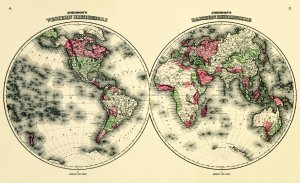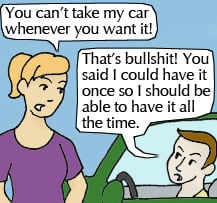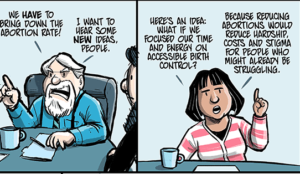Everyday Feminism has been so fortunate to create a community of writers, illustrators, editors, social media managers, and tech geniuses who came together to demystify the big, scary F Word.
(I’m referring to feminism, but we do write about fucking sometimes, too.)
Beyond our community of creators, we have been even more fortunate to garner such an engaged, enthusiastic audience. You all truly do bring us such insightful questions and commentary!
A little while ago, a reader wrote in to us, asking for advice following a breakup. Pretty standard question, right?
However, this reader identifies as a cisgender, heterosexual man and is seeking guidance on how to deal with romantic rejection without turning to online Men’s Rights Activist communities.
I can’t speak for every remotely feminist content creator on the Internet, but I know I have faced my fair share of the Manosphere in my work and in my personal life.
It’s easy for feminist communities to laugh and roll their eyes at Internet people with antifeminist agendas. It’s par for the course to deal with MRAs who comment on our work and infiltrate our Twitter feeds; most of us cope through humor or by ignoring the destructive commentary altogether.
However, being flippant doesn’t erase the fact that these Men’s Rights Activist communities are full of real people who are clearly longing for something that they aren’t finding in their lives or in our society.
Furthermore, the Manosphere needs clicks, comments, and conversations in order to exist at all.
Where are these people coming from? How did they find themselves standing in solidarity with Men’s Rights Activist communities in the first place? How can we help men before they turn to those subreddits?
I don’t claim to know all the answers, but I want to shed some light on why online Men’s Rights Communities aren’t really here to help straight guys through romantic rejection – or their lives in general, really.
What Is the Manosphere?
Just like there are multiple feminisms, there are multiple versions of pro-man, anti-feminist philosophies in the male-centric online communities collectively known as ‘the Manosphere.’
You know how intersectional feminism and Womanism can have some overlap? So can some of the ideas of the Manosphere.
However, to avoid conflating all of the Men’s Rights groups, here’s a quick vocabulary lesson:
Men’s Rights Activists (MRAs) began their movement in response to the feminist movements in the United States in the 1960s and 1970s.
They believe that feminism has shifted society so that women are favored and men are marginalized. They believe they’re fighting for gender equality, but oppose the ideas of patriarchy and kyriarchy, since they believe that men are not socially privileged anymore.
Some MRAs fight for reforms to divorce and child custody laws that they believe unfairly favor mothers and wives. Some oppose rape laws that they believe unfairly target men. Some strive to end childhood sexual mutilation to children with penises, otherwise known as circumcision – a platform that, ironically, feminists also share.
The Red Pill (TRP) is an ideology that also believes that women are inherently privileged in a feminist society.
However, instead of reforming policies and others’ cultural narratives, TRP strategizes to manipulate and upend the structures they believe are oppressing men. Instead of changing the system, they use the system in an attempt to break the system.
Their beliefs are also based in the concept of hypergamy in the sexual marketplace, which implies that women are the deciders, always seeking out the most valuable man available.
According to TRP, women will consistently trade up if their current male partner does not display enough worth and desirability.
Pick-Up Artists (PUA) are mostly men who utilize the ideology of The Red Pill, among other sources, to pick up women the same way a salesperson would close a deal.
They employ specific tactics to improve their dating game and sexual market value as a way to even the score between men and women.
Pick-Up Artists often use techniques to make women feel insecure enough to work for their affection. Their goal is to increase their own sexual market value by closing sexual deals with increasingly high market-value women, such as strippers and other women who haven’t passed their peak of societal sexual attractiveness yet.
Men Going Their Own Way (MGTOW) are, as the title suggests, men who have found it unnecessary to engage with women at all.
Some MGTOW are former Pick-Up Artists who have not achieved the results they had expected, but some still subscribe to the beliefs of The Red Pill.
Because the reader who wrote to us is not in solidarity with the Manosphere, I will refer to these groups collectively as Men’s Rights Groups, male-centric communities, and/or the Manosphere when I am not referencing a specific group.
Also, I have made the choice to only link you to resources that are not run by Men’s Rights Activists and are not directly endorsed by The Manosphere. I do not want to give the Manosphere page clicks, promotion, or revenue.
Now that we have terminology out of the way, here are some reasons why these Men’s Rights communities are harmful to men coping with romantic rejection:
1. The Red Pill Is Not Your Friend
If you’re in the middle of a breakup or a rejection, I hope you have a strong support system of family and friends. We all need somebody to lean on, right?
However, thanks to toxic masculinity in our patriarchal society, there are not enough spaces, physical or digital, that cater to straight men who need emotional guidance.
This is a problem feminists aim to correct, but progress takes time, especially when it comes to unlearning deeply ingrained social and cultural stereotypes of masculinity.
There isn’t a strong enough message being sent to straight dudes that they can and should be talking about their issues and emotions in an open, honest way.
All too often, this is where online Men’s Rights communities come in.
Armed with jargon, methodology, truthiness, and a built-in group of peers, the many iterations of the online Men’s Rights Movement can seem like an awakening to the uninitiated.
When you dig just a little deeper into The Red Pill and Pick Up Artist spaces, though, you will experience refrains of “Be More Alpha,” which is basically a convoluted way of reinforcing the toxic standard of stoic, domineering masculinity.
According to some of the Manosphere, “Alphas” are considered the most valuable, desirable men, because they exert power over others and avoid any and all emotional vulnerability in their social interactions.
These “Alpha” behaviors prevent men from developing proper tools to cope with rejection – or any emotional hardship, really.
In order to “Be More Alpha,” you have to be emotionally “strong” by tearing others down and proving yourself superior – or at least by mimicking other dudes who behave that way.
Some perceive this as a hyper-masculine interpretation of Social Darwinism, usually applied to sexuality in this context.
If you just got rejected, you probably have some feelings to work out – unless you’re a legitimate sociopath (which is actually promoted in some Pick Up Artist circles).
You may feel the need to talk about your issues without being called a “Beta” or a “Pussy.”
But a real friend won’t tell you to “Be More Alpha.” A real friend won’t socially reject you for expressing vulnerability. A real friend won’t lie to you.
…Also, I doubt that a real friend would put up with an emotionally repressed person constantly trying to one-up the world.
Pretty much the entire appeal of having friends is that they won’t allow you to pretend to be okay when you’re really not.
A real friend will actually listen to your thoughts, feelings, and concerns and try to help you heal.
If one of your friends hasn’t told you so yet, let me be the first: You are not alone, and this experience doesn’t define you or your future.
In time, you will move past this difficult moment, partially by surrounding yourself with positive influences, preferably ones who choose not to describe sex with the phrase “Pump and Dump.”
You have permission to experience and express your emotions, and your true friends will be there for you when that happens.
2. Blaming Others Won’t Help You Heal
Rejection can feel like a type of loss. Even if you weren’t actually dating the person who rejected you, it can seem as though you lost the possibility of a relationship.
One way that some people cope with this loss is to turn around and blame the person who rejected them, saying things like “Well, she was crazy anyway” or “She’s stupid for choosing that jerk over me.”
In much of the Manosphere, this sort of blame is placed on all women, not just individuals.
Through generalizations disguised as theory, the Manosphere makes proclamations about women’s desires and behaviors as if all women behave the same exact way and choose only one type of man to pursue.
The Manosphere conveniently forgets that women are allowed to have individual “types” of people – of all genders! – who they like to date.
Even though Red-Pillers and Pick Up Artists would have you believe that all women go for the same type of hyper-masculine, stereotypically macho man, that is patently untrue.
There are women who dig comic book nerds who build puppets and sing Alanis Morrisette. There are women who find themselves consistently dating male feminists of color. There are women who routinely crush on lanky guys who sing opera.
See also: There are queer women who don’t date men at all!
So, can we put the whole “Girls Only Date Macho Douchebag Dudes” myth to bed now? Please?
It’s not the entire gender’s fault that an individual woman rejected you. It’s not the individual woman’s fault that she has her own preferences and autonomy in her dating life. It’s not your fault that you don’t fit that individual woman’s type.
Rejection is painful, but it is ultimately a blameless situation.
Instead of focusing on finding faults in others or in yourself, you should focus your energy on self-care.
3. Self-Care Isn’t a Pick-Up Strategy
When you’re coping with a blow to your self-esteem – like a romantic rejection – it’s imperative that you try to find ways to nurture yourself.
Self-care is essential for people of all genders .We say that a lot on Feminist Internet and Lady-Geared Internet. However, mainstream media and the Manosphere often treat men’s self-care as means to an end.
The self-care advice given to most straight men – inside and out of the Manosphere – goes a little something like this: “Eat protein! Lift heavy things! Get ripped! Overexert! Get laid!”
Are protein, weight-lifting, muscles, and sex inherently unhealthy or exclusively masculine?
No. Not at all. I know I could probably benefit from those forms of self-care.
However, it’s toxic to promote the idea that men must push their bodies to the limit in order to look a certain way, have sex with women, and ultimately achieve an extreme, limited definition of manhood.
Self-care is meant for yourself – not to impress women or make you “more of a man.”
The Red Pill and Pick Up Artist communities often instruct men to work on their physical health and fitness for the sole purpose of being more attractive to women. They don’t care about your individual wellness or anybody else’s; they want you to adhere to the status quo that they’re claiming to fight from the inside.
Self-care isn’t supposed to push you to the point of over-exertion for the benefit of a love interest or for the approval of mainstream society.
It’s literally just taking care of yourself, for yourself.
When you do something that nurtures your mind, body, and/or emotions, that counts as self-care. If you go out of your way to make yourself feel good by constructive means, that counts as self-care.
When you’re feeling low and reeling from a rejection, find the things you can do to build yourself back up again.
Your self-care could manifest itself as exercise and protein like mainstream men’s media says; however, it could also mean setting aside time to practice an instrument, cooking a meal from your childhood, or just giving yourself permission to relax or have fun when constant productivity feels too draining.
Whatever you do, make sure it feeds you. It’s not selfish – it’s self-care. We all have to work on understanding that difference.
What Now?
If you’re coping with a romantic rejection, you need support.
In fact, I’m sure that you already have support from true friends and other people who actually love you. Furthermore, you can find the emotional strength within to take thoughtful care of yourself.
You don’t need to turn to the Manosphere to find comfort or guidance.
True friends want to listen to your real feelings, and they won’t tear you down for actually expressing emotion.
Also, if someone doesn’t love you back, it isn’t such a crime. You don’t need to blame yourself or your unrequited love interest. Sometimes things just don’t work out, because we’re all individuals with unique experiences and specific desires and needs.
In fact, I’d give all this advice to a woman or a queer person just asking for help with their breakup, just without the added detail of the Men’s Rights Movement.
But ultimately, we need to change our perspectives and expectations of straight men. Heterosexual men are not infallible creatures made of muscles and emotional barriers of steel.
Being impenetrable is lonely and breeds bitterness, helplessness, and even extremism.
Please let love, understanding, and self-care into your life. I promise that they will help you more than a red pill ever could.
[do_widget id=’text-101′]
Maddie McClouskey is a Contributing Writer for Everyday Feminism. She’s a twenty-something lesbian in New York City and currently writes weekly dating advice pieces for the LGBTQ event app and website SheSeekOnline and was a regular contributor to the sexuality and feminism site ToughxCookies. When she’s not writing articles about gayness, she’s performing stand-up comedy, singing show tunes to her girlfriend and dog against their will, or making up jokes for Twitter @SoundofMaddie. Read her articles here.
Search our 3000+ articles!
Read our articles about:
Our online racial justice training
Used by hundreds of universities, non-profits, and businesses.
Click to learn more





















